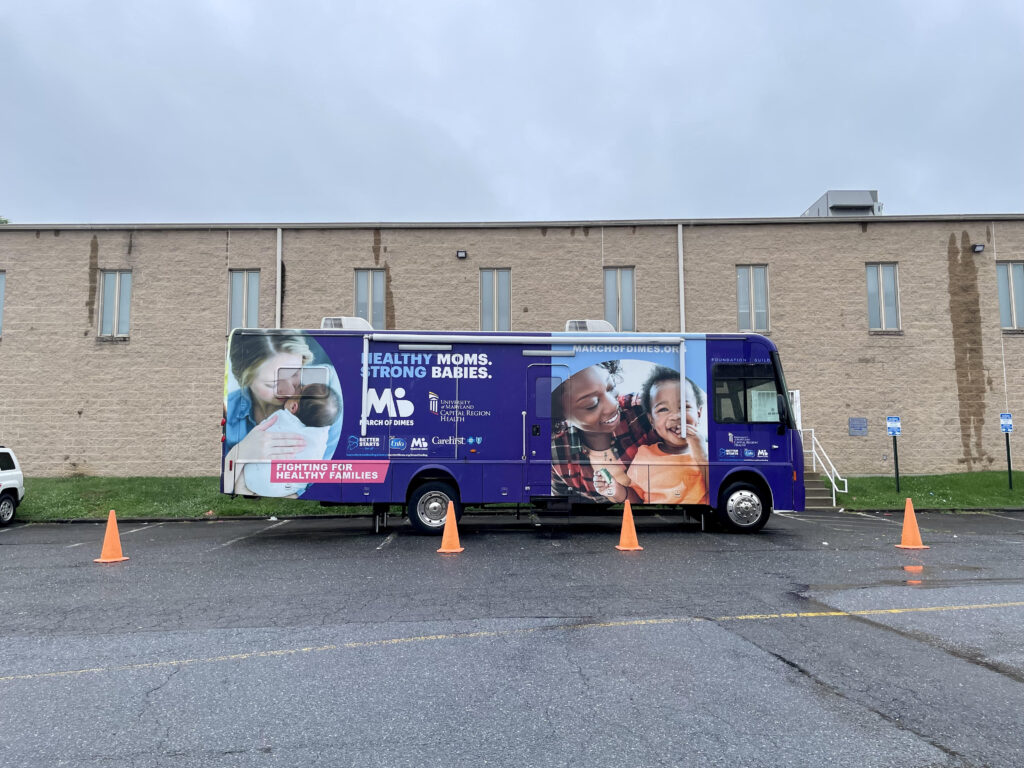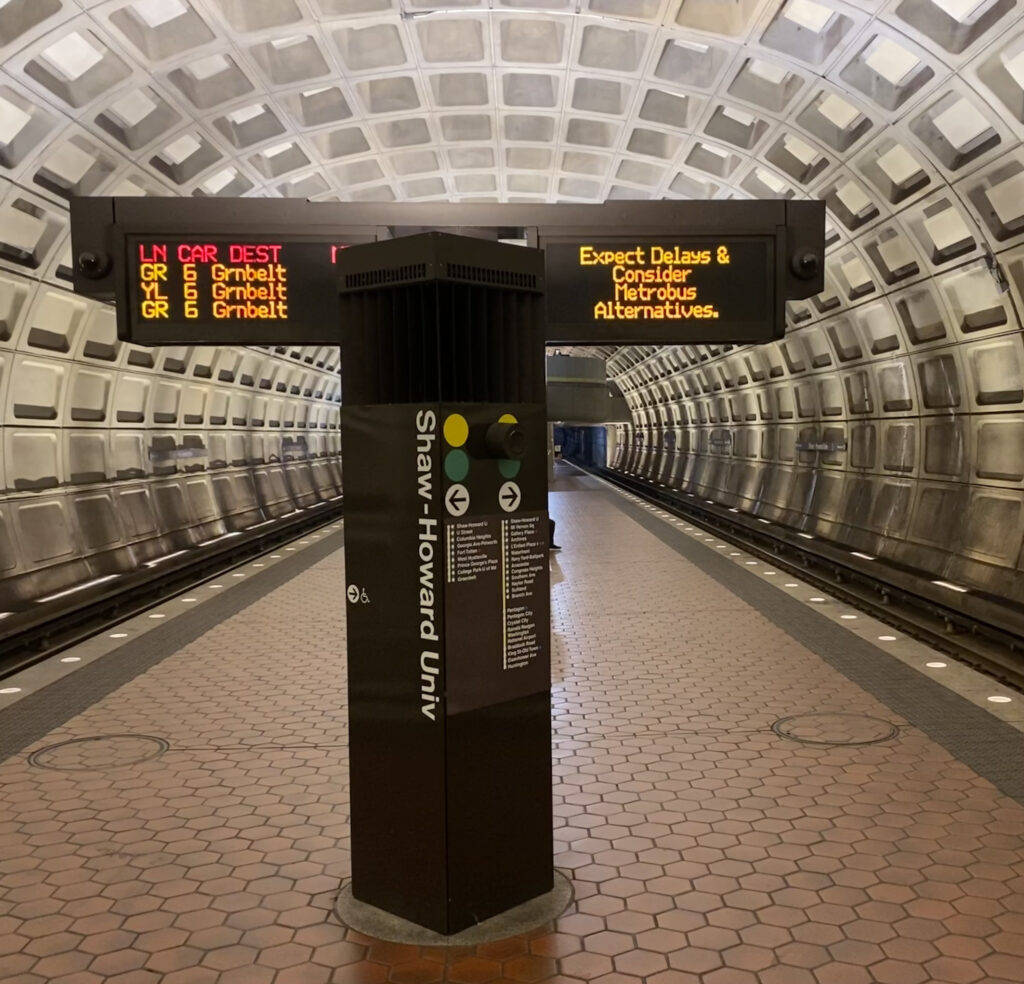In what’s known as a hot spot for maternal mortality in the United States, Mallory Mpare is seeking to make a difference for pregnant people of color in the District through a mobile health clinic that brings comprehensive care to parents and babies in wards 7 and 8.
The “Mama and Baby Bus” provides free services including prenatal, postpartum, and general reproductive care.
Mpare, 34, is the D.C. mission lead for the Better Starts for All program of March of Dimes. The national nonprofit aims to bring on-the-ground maternal health resources and programs to maternity care deserts — regions where few, if any, hospitals are providing access to obstetric care, birth centers, or practicing OB-GYNs or midwives.
The Mama and Baby Bus also offers STD screenings, birth control consultations, breast exams, and Pap smears.
“Anything that you could do in a stationary clinic, you should be able to do in our mobile health clinic,” said Mpare, who has lived in the District for more than 10 years.
The bus itself is led by midwives, a choice intended to encourage patients to develop individualized relationships with their providers, according to Mpare.

“We want to make sure that we have a community focus,” she said of that and other decisions about the program’s operations.
No hospital east of North Capitol Street provides obstetrics care, which is “heartbreaking” for Monique Stevens, a 39-year-old nurse practitioner and midwife with nine years of maternal health experience.
“There’s a great chance that [the patient] may not follow through because she cannot make it to that other location to get that ultrasound, or to have that procedure done,” Stevens said while making referrals for patients. “It can cause sleepless nights.”
The bus operates every other Friday and rotates among the Marshall Heights Community Development Organization in Ward 7, Far Southeast Family Strengthening Collaborative in Ward 8, and University of Maryland Capital Region Health Medical Group in Laurel, Maryland. The mobile clinic is available by appointment only, with some leeway if an emergency occurs. (To make an appointment, call 301-437-5788 on weekdays between 9 a.m. and 4 p.m.)

Insurance is not required, which allows people who don’t qualify for Medicaid, including non-U.S. citizens, to receive care. Immigrants are one of the main recipients of services at the bus, Stevens said.
“A lot of women feel, when they move to a country, they don’t have any care or any help,” Stevens added. “And that’s what this bus is there for, is trying to help them.”
Stevens began her career in the military, where she worked in labor and delivery. She was stationed across the world, including Japan, Iraq, Germany, and California.
“I fell in love with women and women’s health,” Stevens said of the route to her focus on getting families of color access to quality care. “And so that drove me to become the intersectional practitioner I am today. It warms my heart to be able to care for women.”
In her role with March of Dimes, Mpare works with local community partners, hospitals, and organizations to expand the group’s programming and ensure families have access to quality care. The Mama and Baby Bus began operating in the District in February.
Originally from Chapel Hill, North Carolina, Mpare previously worked in women’s health policy and outreach roles for about a decade. In the District and cities around the world, Mpare has seen firsthand how racism fuels negative outcomes in birthing and maternal care, she added.
“Seeing how stark the differences are … for Black women and other women of color and non-Black women was really what drove me to want to do something actionable towards improving those outcomes,” Mpare said. “We know what indicates what a person’s health outcome might be is their race, ethnicity. … It is really racism that shapes those folks’ outcomes.”
According to data from the nonprofit United Health Foundation, the maternal mortality rate in the District in 2019 was 35.6 per 100,000 live births, compared with a national rate of 29.6. The rates for Black women are about twice as high: 71 deaths per 100,000 live births, compared with 63.8 nationally.
Throughout the country, more than 7 million women of child-bearing age live in an area where there is no or limited access to maternity care, according to a 2020 report by the March of Dimes. In D.C., the level of access depends on whether one looks at the city as a whole or at specific wards or neighborhoods.
“What we know in D.C. is that it is a very resource-rich area,” Mpare said. “There are many hospitals and universities that have access to world-class doctors. But that distribution of providers is not evenly distributed across the city.”
Medical racism has affected Black women in a variety of ways since the beginning of modern health care in the United States. J. Marion Sims, known as the father of gynecology, spent years in the 1840s conducting experiments without consent on Black women who were enslaved.
In the 1990s, state legislators introduced bills that, if passed, would have given women convicted of drug use during pregnancy or child abuse a choice between using the birth control Norplant — a contraceptive implant proved to have severe side effects — or serving time in jail. Women of color and those in poverty were targeted by this proposed legislation in what one article deemed an effort to “reduce the underclass.”
Similar abuse still occurs today. In December 2020, more than 30 current and former detainees in a U.S. Immigration and Customs Enforcement facility in Georgia received unwanted or unnecessary gynecological procedures.
As these harsh realities persist, there’s an effort by D.C. lawmakers to bring comprehensive maternal care to wards 7 and 8: Earlier this year, first-term At-Large Councilmember Christina Henderson proposed the Maternal Health Resources and Access Act, a bill seeking to address the maternal care gaps through transportation subsidies and a reimbursement program for doulas through Medicaid.
At the recommendation of the Committee on Health, the D.C. Council allocated funds for the legislation in its version of the fiscal year 2022 budget, which won final approval last week but still needs the mayor’s signature and to go through congressional review. Meanwhile, the budget support act includes authorizing language to establish doulas as a profession regulated by the Board of Medicine.
In funding the legislation, the council’s budget provides $480,000 annually to cover travel costs for commuting to and from appointments starting in October 2021. Reallocated funds from the American Rescue Plan will also be used for Medicaid reimbursement for doula and midwife services from fiscal years 2022 to 2024.
Legislation like Henderson’s is new, and there’s no model for how the proposed services would look in practice, according to Mpare. But programs like doula reimbursements appear to be a “promising practice” to expand access to care, she said.
“It’s really exciting,” she said.
This article was co-published with The DC Line.






